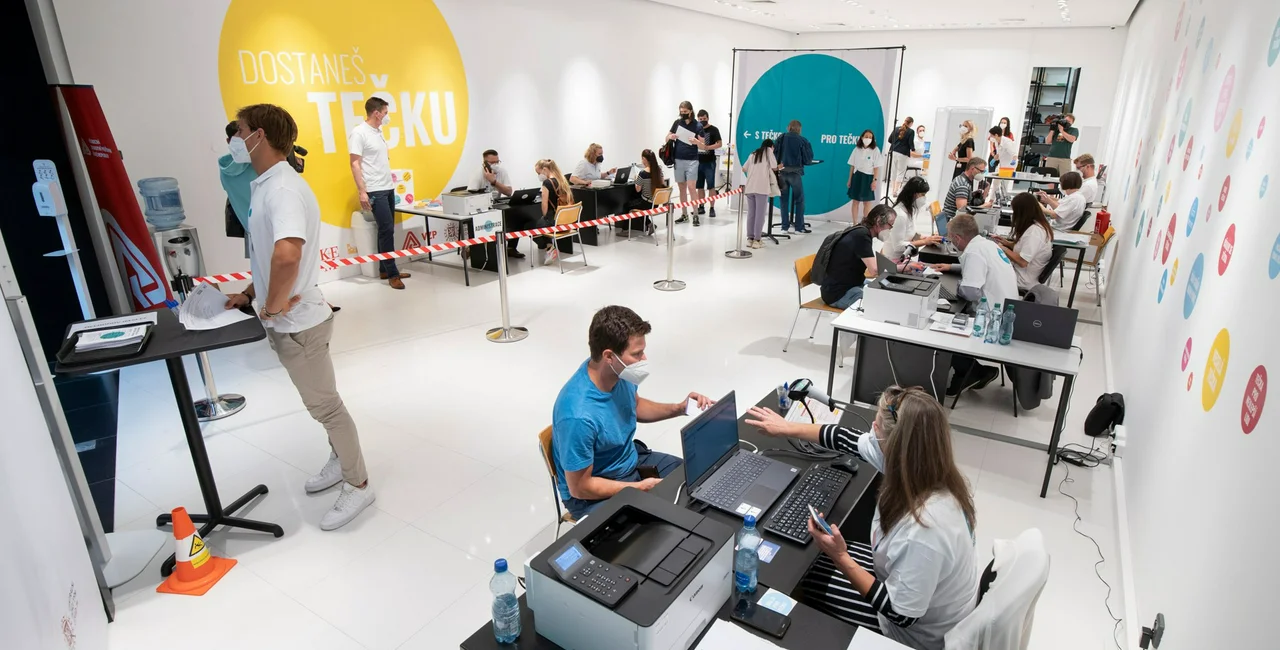Thousands of people without public insurance vaccinated
More than a month after the start of registration, 15,842 people without public insurance have paid for vaccination against Covid, news server Novinky.cz reported. These are usually foreigners who stay in the Czech Republic for a longer period of time, but who cannot get public insurance. So far, only a few hundred people have asked for reimbursement for the vaccine and its administration. For self-payers, the state set aside the two-dose vaccine from Pfizer/BioNTech. For both doses, people pay a total of CZK 1,620. "We have recorded 214 reported insurance claims for the vaccination of foreigners, of which 100 insurance claims have already been paid out," said Klára Bílá of Pojišťovna VZP, a subsidiary of Všeobecná zdravotní pojišťovna that provides private insurance to foreigners. Dozens of doses were also received by clients of other insurance companies. In the first half of June, the state set aside 21 vaccination centers for foreigners without public insurance. They can also go to some walk-in sites such as the Westfield Chodov shopping mall.
Vaccinated state employees may have two days of paid leave
The Czech government will deal with the proposal that state employees who were vaccinated against the coronavirus this year get extra two days of paid leave, Prime Minister Andrej Babiš told journalists after his talks with Pavel Bednář, head of the trade unions of state employees. Babiš said he would submit the proposal to the government on Friday. It would concern all state employees, he added. He also said the government would task all ministers and office heads to give two days of paid leave to other employees who do not fall under the civil service, including the armed corps. The government recommends that regional and municipal authorities and private companies take similar steps.
"The vaccination had an impact in some cases, people had fever, did not feel well. They deserve it," Babiš said.
He said this step is essentially a way to motivate people to get vaccinated. Czech ministries, state authorities and organizations controlled by them employ nearly half a million people.
Poll: Czechs' mental health improving
Czechs' mental health has improved as against the time of Covid waves, but still it is not in the condition from before March 2020, according to a poll called Life During the Pandemic conducted by PAQ Research, sociologist Daniel Prokop told journalists. Roughly one-tenth of the respondents showed symptoms of mental problems in July, while it was up to one-fifth during the waves of the epidemic since last spring, Prokop said. The negative impact of Covid on employment and poverty has faded away, he added.
"Young people who interrupted their leisure activities and those who faced an economic impact of the epidemic have more problems," he added.
Before the epidemic, about 6 percent felt some symptoms of depression or anguish, but the figure rose to 10 percent by July. During the individual waves of the epidemic mental problems were felt by 11 to 19 percent of Czechs. The proportion of those working without any limitations has returned to the time before the crisis. It is 69 percent now. Income poverty has also almost returned to the time before the crisis. It surged from 9 to 20 percent after the outbreak last spring. Between September 2020 and this July, 10-12 percent of the respondents were below the poverty line.
Czechs more cautious against Covid than last summer
Czechs are currently more cautious than last summer due to the risk of Covid-19 infection. They wear respirators or masks more often, go to pubs less, older people become more isolated, and work from home is used a little more. The average number of personal contacts in July was around 19 per week. Last year it was 23. It follows from the next stage of the Life During the Pandemic, conducted by PAQ Research,, which was reported by sociologist Daniel Prokop. According to him, however, the number of people who are being tested has decreased in the last month. About 12 percent of people completely reject vaccinations.
Health Ministry sent a payment for unused field hospital
The Health Ministry sent CZK 88.2 million to the Bulovka University Hospital in Prague for the operation of a field hospital at the exhibition center in Letňany, which served as a reserve in case of overcrowding of patients with Covid-19. The hospital should receive payment within a few days, Health Minister of Adam Vojtěch said on Twitter. The ministry set aside money within its budget.
"Bulovka was instructed by the Ministry of Health to set up a hospital, so it is fair to reimburse it," Vojtěch said.
Bulovka recently applied for money for a field hospital from the Finance Ministry, which rejected the request. The army built a backup hospital in Letňany at the end of October last year due to the deteriorating situation in medical facilities in the autumn. According to plans, up to 500 patients could find help in the exhibition halls. The hospital was never fully operational, partly due to a lack of staff.
Nemocnici @NaBulovce jsme dnes odeslali 88,2 mil. KÄ za realizaci polnà nemocnice v Letňanech. Na úÄtu by je mÄ›la mÃt v řádu dnů. ProstÅ™edky jsme vyÄlenili v rámci rozpoÄtu @ZdravkoOnline. Bulovka dostala zÅ™Ãzenà nemocnice od MZ pokynem, je tedy spravedlivé jà náklady uhradit.
— Adam VojtÄ›ch (@adamvojtechano) July 28, 2021
Public health insurance ended in a surplus, despite pandemic
Despite the Covid epidemic, the public health insurance system ended last year in a surplus of CZK 5.8 billion. Despite the high costs associated with the epidemic, the system managed to accumulate reserves. The reason was that premium income did not decrease compared to 2019, and at the same time the payment for state insured persons jumped by CZK 25.4 billion. Revenues of public health insurance last year amounted to CZK 358 billion, and expenditures were CZK 352.2 billion The costs of health services increased by CZK 48 billion crowns year-on-year. "In 2020, the finances of health insurance companies ended in a surplus for the fifth time in a row, and their bank account balances increased by almost 10 percent to CZK 64.4 billion last year," said Finance Minister Alena Schillerová. According to Health Minister Adam Vojtěch, it turned out to be prudent that health insurance companies maintained their reserves.
"Thanks to these funds and the increase in the payment of the state, the availability and quality of health services were not endangered even with such an extreme load on the health system," Vojtěch said.
DÃky významnému zvýšenà platby státu a rezervám pojiÅ¡Å¥oven nebyla ani pÅ™i tak extrémnÃm zatÞenà zdravotnÃho systému v dobÄ› covid-19 ohrožena dostupnost a kvalita zdravotnà péÄe pro naÅ¡e obÄany.
— Adam VojtÄ›ch (@adamvojtechano) July 28, 2021
New cases continue to drop week on week
The number of new Covid cases reported for Wednesday was 195, down from last week’s 232. The number of hospitalized people dropped to 47, with eight in serious condition. No deaths were reported for the seventh day in a row, and a total of 12 people have died from Covid-related causes in July. The index number of new cases per 100,000 people over seven days remained steady at 12. The reproduction number R was virtually unchanged at 0.86. For Prague, where the pandemic is worst, the index number dropped by one to 26, and the R number was at 0.73.
Latest Covid-19 data from the Czech Ministry of Health (July 29, 2021)
- New cases 195
- Deaths 30,363
- Currently hospitalized 47
- PCR tests performed 8,900,075
- Antigen tests performed 23,765,704
- Total vaccinations 10,192,335
- Daily increase in vaccinations 59,621
- People who have completed vaccination 4,735,654
- New cases per 100,000 in seven days 12
- PES index 17
- R number 0.86












 Reading time: 5 minutes
Reading time: 5 minutes 





























